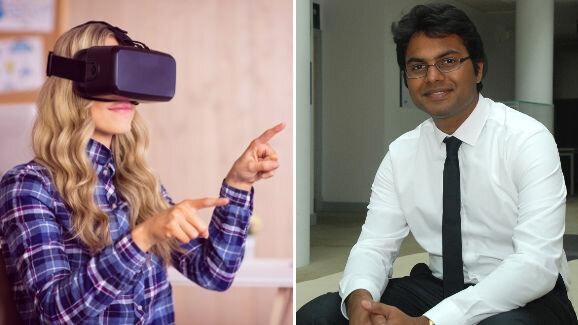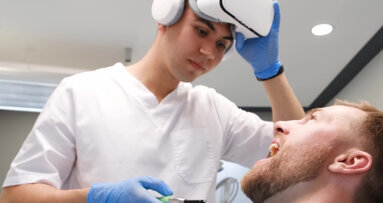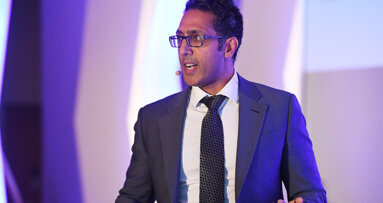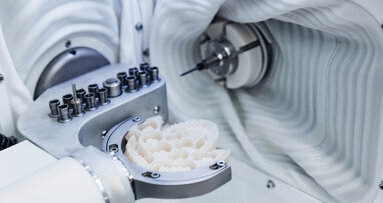HUDDERSFIELD, UK: A University of Huddersfield researcher is harnessing the latest virtual reality technology to help oral and maxillofacial surgical trainees practise complex dental surgeries. His project aims to provide accurate 3-D visualisations of human anatomy and surgical procedures using Oculus Rift, a virtual reality head-mounted display.
Indian-born Yeshwanth Pulijala is a qualified dental surgeon. During his training, he was confronted with the problem of poor visualisation of dental procedures in the operating room. Being aware of these shortcomings in surgical training, as well as passionate about 3-D design and technology, he relocated to the UK to pursue postgraduate research on the use of advanced technology to improve health care.
During his master’s studies on 3-D medical visualisation at the University of Glasgow, Pulijala created a mobile app called SurFace that provides patient education in corrective jaw surgery. This inspired him to explore the potential of virtual reality for surgical education, using Oculus Rift. A commercial version of the device is expected to be released in the first quarter of 2016. However, Pulijala, who is currently studying for a PhD at the University of Huddersfield, was able to obtain the developer version for his research.
Learning through observation and hands-on participation is an important part of the education of surgical trainees, and medical and dental students, according to Pulijala. “During these sessions the trainees learn by observing the procedures in real time,” he stated. “But the problem is that not everybody can see what is happening. This is especially the case in crowded operating rooms where surgical trainees perform multiple duties. Also in surgeries confined to oral and maxillofacial zone, as the structures are complex and densely enclosed in a confined space, it is very hard to observe and learn. Further, a reduction in surgical training hours is severely affecting the training of surgeons,” Pulijala pointed out.
As a result, he continued, four out of ten surgical trainees are not confident in performing a procedure. Therefore, he is developing a tool that enables them to participate virtually in an operation. His PhD project aims to provide trainee surgeons with close-up, unrestricted 360-degree views of a surgical procedure, yielding the potential to improve surgical training substantially. “If you are a trainee surgeon, wearing an Oculus Rift, you will see the surgical procedure in an operating room environment and also be able to ‘touch’ the skull of the patient and interact with it,” Pulijala said.
He is currently developing the project concept and producing working prototypes. In the longer term, he envisions a system that will enable surgical trainees to practise and perform virtual operations. “But at the moment it is about creating a high-quality visualisation, interacting with the patient’s data and seeing their anatomy in great detail,” he concluded.
The “Dentaverse” aims to reduce the gap between physical and virtual dental care for dental professionals and dental students. A new report ...
LONDON, UK: Health Poverty Action, a UK-based international development organisation, has published a new report on the consequences of the migration of ...
YORK, UK: Perhaps unfairly, the teeth of Britons have developed an international reputation for being crooked and aesthetically subpar. Researchers have ...
The link between oral health and systemic heath has been long understood by dental experts. Now preliminary research, to be presented at the American Stroke...
BRADFORD, UK: According to a recent study, it is not only the obvious physical features that help to distinguish men from women, but also some subtler ...
LONDON, UK: Global medical device company Align Technology has recently announced that it has moved its 2020 Growth Summit to an all-digital format. The ...
Artificial intelligence (AI) has moved from theory into daily prosthodontic practice, reshaping diagnosis, treatment planning and design workflows. My ...
NEWCASTLE, UK: Given the abundance of dietary recommendations that can be accessed these days, understanding what we should and should not eat can be a ...
LONDON, UK: Dr Mark Richardson, a vice dean of the Faculty of General Dental Practice (UK), has been appointed as [Honorary Dental Surgeon] to Her ...
LONDON, UK: It has been established that patients with a phobia of dentistry may often delay visiting the dentist or avoid it altogether. It comes as ...
Live webinar
Tue. 24 February 2026
6:00 pm UTC (London)
Prof. Dr. Markus B. Hürzeler
Live webinar
Tue. 24 February 2026
8:00 pm UTC (London)
Prof. Dr. Marcel A. Wainwright DDS, PhD
Live webinar
Wed. 25 February 2026
4:00 pm UTC (London)
Prof. Dr. Daniel Edelhoff
Live webinar
Wed. 25 February 2026
6:00 pm UTC (London)
Live webinar
Thu. 26 February 2026
1:00 am UTC (London)
Live webinar
Tue. 3 March 2026
4:00 pm UTC (London)
Dr. Omar Lugo Cirujano Maxilofacial
Live webinar
Wed. 4 March 2026
1:00 am UTC (London)
Dr. Vasiliki Maseli DDS, MS, EdM



 Austria / Österreich
Austria / Österreich
 Bosnia and Herzegovina / Босна и Херцеговина
Bosnia and Herzegovina / Босна и Херцеговина
 Bulgaria / България
Bulgaria / България
 Croatia / Hrvatska
Croatia / Hrvatska
 Czech Republic & Slovakia / Česká republika & Slovensko
Czech Republic & Slovakia / Česká republika & Slovensko
 France / France
France / France
 Germany / Deutschland
Germany / Deutschland
 Greece / ΕΛΛΑΔΑ
Greece / ΕΛΛΑΔΑ
 Hungary / Hungary
Hungary / Hungary
 Italy / Italia
Italy / Italia
 Netherlands / Nederland
Netherlands / Nederland
 Nordic / Nordic
Nordic / Nordic
 Poland / Polska
Poland / Polska
 Portugal / Portugal
Portugal / Portugal
 Romania & Moldova / România & Moldova
Romania & Moldova / România & Moldova
 Slovenia / Slovenija
Slovenia / Slovenija
 Serbia & Montenegro / Србија и Црна Гора
Serbia & Montenegro / Србија и Црна Гора
 Spain / España
Spain / España
 Switzerland / Schweiz
Switzerland / Schweiz
 Turkey / Türkiye
Turkey / Türkiye
 UK & Ireland / UK & Ireland
UK & Ireland / UK & Ireland
 International / International
International / International
 Brazil / Brasil
Brazil / Brasil
 Canada / Canada
Canada / Canada
 Latin America / Latinoamérica
Latin America / Latinoamérica
 USA / USA
USA / USA
 China / 中国
China / 中国
 India / भारत गणराज्य
India / भारत गणराज्य
 Pakistan / Pākistān
Pakistan / Pākistān
 Vietnam / Việt Nam
Vietnam / Việt Nam
 ASEAN / ASEAN
ASEAN / ASEAN
 Israel / מְדִינַת יִשְׂרָאֵל
Israel / מְדִינַת יִשְׂרָאֵל
 Algeria, Morocco & Tunisia / الجزائر والمغرب وتونس
Algeria, Morocco & Tunisia / الجزائر والمغرب وتونس
 Middle East / Middle East
Middle East / Middle East

















































To post a reply please login or register